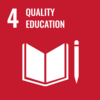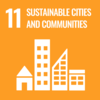Uniminuto's educational garden is conceived as a pedagogical strategy that contributes to improve the sustainability competencies of students and local communities. The main objective is to enable students to use this living laboratory to create innovative teaching proposals that will allow them to address different challenges facing humanity, such as climate change, and to train professionals committed to the knowledge and conservation of nature and its biodiversity for human and non-human wellbeing. Extreme weather events have directly affected food security in several sectors of Colombia's Valle del Cauca region, This proposal considers impacting the Global Sustainable Development Goals (SDGs), especially goal 13 on climate action and specifically target 13.1, aimed at strengthening resilience and adaptive capacity to these effects.
In this way, this initiative aims to be a model of self-management that links the entire university community in the implementation of an agricultural production system based on educational urban gardens as an alternative that seeks to generate changes through action.
Starting a living lab like this is an amazing example of how to let students take on real-world challenges. They've done very well to include all sorts of students and invite students from other institutions to make use of the garden as well, helping them learn and develop skills. The judges would love to see further evidence of how the skills being developed are used, and how the university can be a role model for the wider community and sector.
The initiative had a comprehensive approach to sustainability and it was well written with abundant evidence for its positive impacts. Overall, we loved this change model.
"We believe that this recognition can generate several impacts. Within the University, it is strengthening the sustainable thinking of students, at the city and regional level we can achieve greater visibility so that the educational garden can obtain more resources and in addition to becoming a pilot model of educational gardens as food security strategies to strengthen human welfare and the generation of more sustainable and resilient territories.”
Juan Pablo Mantilla Alvarez, Padre Rector


